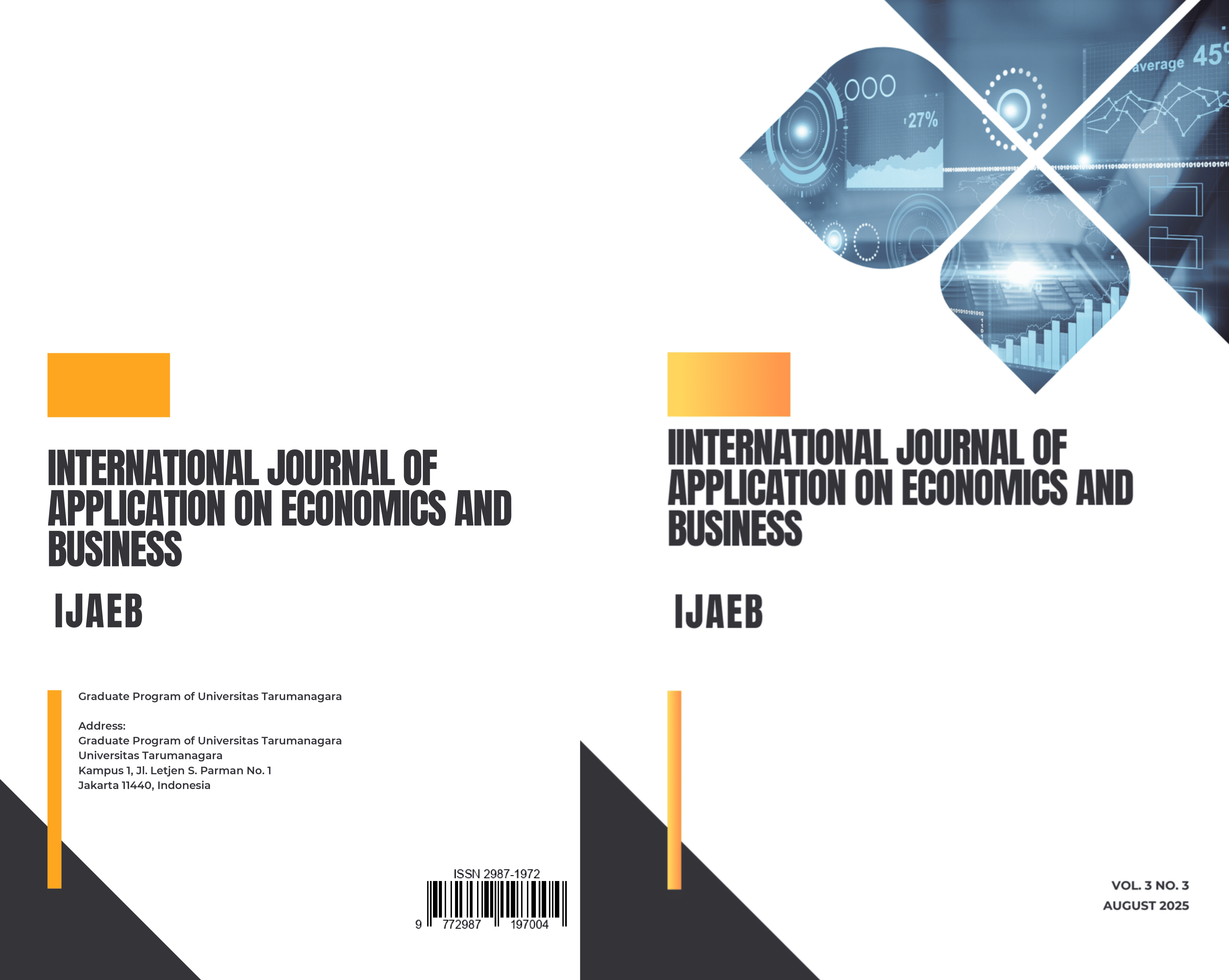THE INFLUENCE OF ENTREPRENEURIAL ORIENTATION, WORK-LIFE BALANCE, AND CAREER CHOICE ON THE ENTREPRENEURIAL INTENTION OF GENERATION Y
Main Article Content
Abstract
Entrepreneurial intentions in Generation Y are influenced by various factors that reflect their preferences and life orientation. Entrepreneurial orientation will form a proactive mindset and dare to take risks. Work-life balance is also an important consideration for Generation Y who crave flexibility and balance between their personal and work lives. Meanwhile, career choice determines the direction of an individual's decision in choosing the career that best suits their aspirations, including the tendency to become an entrepreneur. Therefore, these three factors are seen as interrelated in influencing the entrepreneurial intention of Generation Y. The purpose of this research is to enrich the literature related to the variables of entrepreneurial orientation, work life balance, and career choice on the entrepreneurial intention of Generation Y. The sample amounted to 100 employee respondents in the age range of generation Y.
Article Details
Section

This work is licensed under a Creative Commons Attribution-NonCommercial-ShareAlike 4.0 International License.
This journal provides immediate open access to its content on the principle that making research freely available to the public supports a greater global exchange of knowledge.
IJAEB by Graduate Program of Universitas Tarumanagara is licensed under a Creative Commons Attribution-NonCommercial-ShareAlike 4.0 International License.. Permissions beyond the scope of this license may be available at https://journal.untar.ac.id/index.php/ijaeb
References
Adisa, T. A., Gbadamosi, G., Mordi, T., & Mordi, C. (2019). In search of perfect boundaries? Entrepreneurs’ work-life balance. Personnel Review, 48(6), 1634–1651. https://doi.org/10.1108/pr-06-2018-0197
Aeni, S. N. (2022, March 8). Generasi Milenial dan Peranannya dalam Perekonomian Indonesia. Katadata. https://katadata.co.id/berita/nasional/622712c8ace6a/generasi-milenial-dan-peranannya-dalam-perekonomian-indonesia
Akosah-Twumasi, P., Emeto, T. I., Lindsay, D., Tsey, K., & Malau-Aduli, B. S. (2018). A systematic review of factors that influence youths career choices—the role of culture. Frontiers in Education, 3. https://doi.org/10.3389/feduc.2018.00058
Asante, E. A., & Affum-Osei, E. (2019). Entrepreneurship as a career choice: The impact of locus of control on aspiring entrepreneurs’ opportunity recognition. Journal of Business Research, 98, 227–235. https://doi.org/10.1016/j.jbusres.2019.02.006
Ciampi, F., Demi, S., Magrini, A., Marzi, G., & Papa, A. (2020). Exploring the impact of big data analytics capabilities on business model innovation: The mediating role of entrepreneurial orientation. Journal of Business Research, 123, 1–13. https://doi.org/10.1016/j.jbusres.2020.09.023
De Clercq, D., Brieger, S.A. When Discrimination is Worse, Autonomy is Key: How Women Entrepreneurs Leverage Job Autonomy Resources to Find Work–Life Balance. Journal of Business Ethics, 177, 665–682 (2022). https://doi.org/10.1007/s10551-021-04735-1
Genc, E., Dayan, M., & Genc, O. F. (2019). The impact of SME internationalization on innovation: The mediating role of market and entrepreneurial orientation. Industrial Marketing Management, 82, 253–264. https://doi.org/10.1016/j.indmarman.2019.01.008
Lee, P. C., Lee, M. J., & Dopson, L. R. (2018). Who influences college students’ career choices? An Empirical study of hospitality management students. Journal of Hospitality & Tourism Education, 31(2), 74–86. https://doi.org/10.1080/10963758.2018.1485497
McLean, L., Taylor, M., & Jimenez, M. (2019). Career choice motivations in teacher training as predictors of burnout and career optimism in the first year of teaching. Teaching and Teacher Education, 85, 204–214. https://doi.org/10.1016/j.tate.2019.06.020
Meoli, A., Fini, R., Sobrero, M., & Wiklund, J. (2020). How entrepreneurial intentions influence entrepreneurial career choices: The moderating influence of social context. Journal of Business Venturing, 35(3), 105982. https://doi.org/10.1016/j.jbusvent.2019.105982
Munawar, A. (2019). Pengaruh pendidikan kewirausahaan dan self efficacy terhadap minat berwirausaha siswa. Prosiding Seminar Nasional Pendidikan KALUNI, 2. https://doi.org/10.30998/prokaluni.v2i0.105
Mohan, P. S. (2022). An investigation into entrepreneurial intentions in Caribbean Small Island Developing States. Journal of Innovation and Entrepreneurship, 11(1). https://doi.org/10.1186/s13731-022-00253-0
Nugroho, R. S. (2021, December 26). Mengenal Apa Itu Generasi Baby Boomers, X, Y, Z, Millenials, dan Alpha Halaman 2 - Kompas.com. KOMPAS.com. https://www.kompas.com/tren/read/2021/12/26/170000565/mengenal-apa-itu-generasi-baby-boomers-x-y-z-millenials-dan-alpha?page=2
Palumbo, R. (2020). Let me go to the office! An investigation into the side effects of working from home on work-life balance. International Journal of Public Sector Management, 33(6/7), 771–600. https://doi.org/10.1108/ijpsm-06-2020-0150
Putry, N. A. C., Wardani, D. K., & Jati, D. P. (2020). Pengaruh efikasi diri terhadap minat berwirausaha melalui motivasi sebagai variabel intervening. Jurnal Sosial Ekonomi dan Humaniora, 6(1), 14–24. https://doi.org/10.29303/jseh.v6i1.71
Sun, X., Xu, H., Köseoglu, M. A., & Okumus, F. (2019). How do lifestyle hospitality and tourism entrepreneurs manage their work-life balance?. International Journal of Hospitality Management, 102359. https://doi.org/10.1016/j.ijhm.2019.102359
Tysara, L. (2024, January 24). Perbedaan Gen X, Y, dan Z, Perhatikan Masing-Masing Karakteristiknya. liputan6.com. https://www.liputan6.com/hot/read/5512801/perbedaan-gen-x-y-dan-z-perhatikan-masing-masing-karakteristiknya?page=4
Valencia-Arias, A., Montoya, I., & Montoya, A. (2018). Constructs and relationships in the study of entrepreneurial intentions in university students. International Journal of Environmental & Science Education, 13(1), 31-52. http://www.ijese.net/makale_indir/IJESE_2007_article_5a5ccb9d691d6.pdf
Vodă, A., & Florea, N. (2019). Impact of personality traits and entrepreneurship education on entrepreneurial intentions of business and engineering students. Sustainability, 11(4), 1192. https://doi.org/10.3390/su11041192
Wales, W. J., Covin, J. G., & Monsen, E. (2020). Entrepreneurial orientation: The necessity of a multilevel conceptualization. Strategic Entrepreneurship Journal, 14(4), 639–660. https://doi.org/10.1002/sej.1344
Wood, J., Oh, J., Park, J., & Kim, W. (2020). The relationship between work engagement and work–life balance in organizations: a review of the empirical research. Human Resource Development Review, 19(3), 240–262. https://doi.org/10.1177/1534484320917560
Yukongdi, V., & Lopa, N. Z. (2017). Entrepreneurial intention: a study of individual, situational and gender differences. Journal of Small Business and Enterprise Development, 24(2), 333–352. https://doi.org/10.1108/jsbed-10-2016-0168

